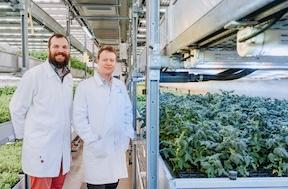
Phytoform Labs has fine-tuned the Alisa Craig tomato variety genes to boost yield by up to 400 percent through dense planting of compact plants. The plants are one-sixth the size of the conventional Alisa Craig, with 50 or more plants in the same area usually used by a single plant. Although the vegetation size changed dramatically, the fruit is unchanged.
“We started with a salad variety that was already very nutritious and flavorful,” explains Dr. Will Pelton, Phytoform Labs. “We were worried that if we shrunk the plant, we would also shrink the fruit. That was not the case. Our tomatoes are the original size.”
Phytoform, a U.S./British company, changed the tomato using CRISPR-based gene editing. Geneticists use CRISPR to cut a gene’s DNA, then modify it using natural DNA repair processes.
They’re currently using AI (artificial intelligence) to rapidly search large data sets from existing genetic research for specific gene changes that can be used to improve drought tolerance and other beneficial traits. Pelton likens AI to a surgeon’s brain and CRISPR-based gene editing to the surgeon’s scalpel.
“The scalpel is nothing without the surgeon’s brain knowing where to cut and how,” he says. “We created an AI tool to identify where and how to use CRISPR with a very light touch on the genes. We don’t add or remove genes; we simply work with ones that are there.”
Pelton and others in the company had worked with both technologies in academic research and wanted to apply them in a more impactful way.
“We focused on the tomato as a good crop to start with,” says Pelton. “It’s a high-value crop that produces lots of seeds. We felt we could have a lot of impact with tomatoes.”
They started out working with open-field production, developing the technology, and finding some success. At the suggestion of a marketing intern, they refocused on indoor vertical farming. This industry has struggled to add high-value crops to its proven production of leafy greens.
The results with the Alisa Craig variety have been positive, notes Pelton. “We’ve had a lot of positive feedback and are already working on our next generation of products,” he says. “We hope to commercialize production in the U.K., perhaps as soon as this spring, as well as in the U.S. and Australia.”
Phytoform is working with other tomato and potato varieties and plans to apply its technologies to other crops. Commercial greenhouse producers have shown an interest in the compact Alisa Craig variety, and the company has developed a tomato variety for open-field production to be introduced in Florida.
Home gardeners won’t be planting dense beds of lettuce-height tomatoes any time soon. “We’re establishing commercial production first,” says Pelton. “Then we may expand to home garden sales.”
Contact: FARM SHOW Followup, Phytoform Labs, Rothamsted Research, Harpenden AL5 2JQ, United Kingdom (william.pelton@phytoformlabs.com; www.phytoformlabs.com).
